Goth Chick News: Traveling the YellowBrickRoad With Andy Mitton and Jesse Holland
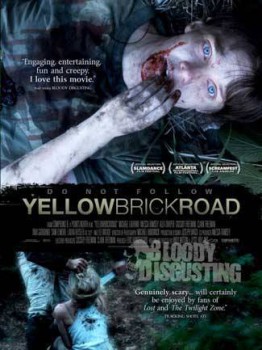 Last week I had the pleasure of bringing you an early look at the new indy horror film YellowBrickRoad. But much like the elusive Great and Powerful Oz himself, YBR writers and directors Andy Mitton and Jesse Holland wished to remain firmly behind the curtain until the movie was released. YBR hit select AMC theaters nationwide on June 1st and true to their word, the magicians responsible for this amazing story have come over for a chat.
Last week I had the pleasure of bringing you an early look at the new indy horror film YellowBrickRoad. But much like the elusive Great and Powerful Oz himself, YBR writers and directors Andy Mitton and Jesse Holland wished to remain firmly behind the curtain until the movie was released. YBR hit select AMC theaters nationwide on June 1st and true to their word, the magicians responsible for this amazing story have come over for a chat.
And a good thing to, because it wasn’t like the curiosity hadn’t already gotten to me when I picked up last weekend’s Chicago Tribune to find a sizable write up about YBR. After spending the first moment gloating over how I’d gotten there first, I spent the second moment amazed at how the local movie critic, who generally hates everything but foreign films with subtitles, seemed to have fallen breathlessly in love the YBR.
In the third moment I was manic with questions (how the heck does an indy film get a distribution deal with AMC and a Chicago Tribune accolade anyway?) and sprinting for the computer.
Thankfully, Jesse and Andy were ready to dish the deets on what is so far my favorite horror flick of 2011, indy and mass market included.
So grab a munchkin and a lollipop and come in a little closer; the men on the YellowBrickRoad have an interesting tale to tell.
An Interview with Andy Mitton and Jesse Holland
Conducted and transcribed by Sue Granquist, May 2011
GC: What first got you interested in film making? Was it to meet girls?
AM & JH: Obviously. But no, we’ve both wanted to be storytellers for as long as we can remember, and we come from the theater. But movies and making movies have been on our mind as friends and colleagues for some time, especially the desire to tell new and original stories. Between us we have skills in motion graphics, sound design, composing, and editing, and we ended up using them all to get the movie done. However, these skills were developed over long hours in dark rooms staring at computer screens while everyone else was out meeting girls, unfortunately.
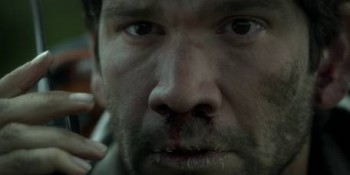 Is there a particular genre you most enjoy writing in / about?
Is there a particular genre you most enjoy writing in / about?
Not really, although we’ve been horror buffs for a long time and are excited to make more horror movies. Mostly we just like stories that are more than just escapism; that take you on a journey and manage to make an imprint that stays with you longer than the movie lasts. But we think good movies in all genres can accomplish this. What we’ve really enjoyed about coming into the horror ring is that the fan base is so loyal and hungry and excited for new things.
Having been both writer and director, which role do you prefer and why?
Directing is definitely more fun and much healthier. You’re organized and prepared and you get really good at interacting with people and communicating your ideas. When it goes well, it’s just a real rush. With writing, you just gradually become a caveman and you forget how to talk to people and you crave the sunlight. But the greatest high of either role comes in the feeling you have after a truly great writing session.
I researched both of you and it appears this is the first full-length movie outing for each. Is this true and if so, how did you go about bringing YellowBrickRoad to the big screen?
Yes, this is our first feature, but like we mentioned before, we’ve been telling stories for a long time in other mediums. So we did have resources and talented friends to draw on after years working in the theater and in Los Angeles post-production.
This whole project, from the script up, was designed to utilize our strengths and resources so we could do it all on our own on a small budget. We willed it into existence inch by inch – we made a website, a business plan, a teaser trailer out of fake footage from Malibu, created creepy soundtracks with 30s music playing over forest sounds, anything we could do to inspire people.
When we got Eric Hungerford aboard as producer, and Clark and Cassidy Freeman as actors and executive producers, the wheels really started to roll. We had people behind us who believed in what we were doing and thought it would be worth it to shoot on location in the middle of nowhere and have a crazy adventure that would ultimately become not only a movie, but a turning point in our lives.
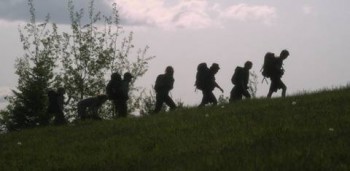 The basis of the story line seemed so realistic that I actually went researching to see if there was a true event behind the plot. Where did you get the idea for the premise of YellowBrickRoad?
The basis of the story line seemed so realistic that I actually went researching to see if there was a true event behind the plot. Where did you get the idea for the premise of YellowBrickRoad?
It was mostly built to serve our purposes for the modern-day story we wanted to tell. But we researched Jonestown and other cases of mass delusion or mass suicide, choosing some of our favorite details to mix into our own story. People have cited Roanoke as being something we drew on, but we only came across that after we made the movie. Really we just wanted Friar, New Hampshire to feel like a real place, and our back story to feel like a real piece of New England backwoods folklore.
In your opinions, what is the scariest aspect of YBR?
For us, it’s the presence of the UNCANNY, the thing that can’t possibly be there…but is anyway. That sense of not just the unknown, but the unknowable, and how dangerous and humbling it feels to stand in the face of it.
The film was very “psychological” and its subtlety is part of what has earned the film rave reviews from the Orlando Sentinel to the Chicago Tribune. Explain what you feel is magical about “horror that approaches quietly.”
In our opinion, you earn that magic with patience. Patience lets you build tension, whereas lots of little scares along the way release tension, letting the air out of the balloon per say, and gets in the way of creating that psychological horror you’re referring to. And the real magic comes when you realize that since you’ve been so patient with the front half, you can really earn a wild ride in the back half. Just like the scariest part of a roller coaster is chugging slowly up that first hill.
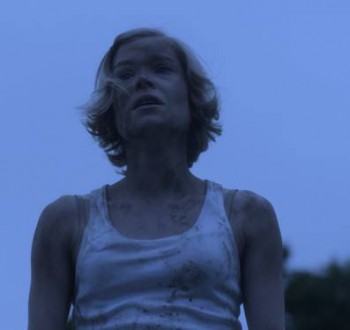 Would you categorize YBR as an “indy” horror film and if so, how did you score a distribution deal with AMC Theaters as opposed to the standard neighborhood playhouses?
Would you categorize YBR as an “indy” horror film and if so, how did you score a distribution deal with AMC Theaters as opposed to the standard neighborhood playhouses?
Yes, make no mistake – we’re a tried and true independent horror film. This movie was made on a micro-budget without any studio oversight. Points North Films was simply the LLC we formed so we could be a legal entity. And although there were many people helping us and advising us, our creative hands were never forced and we got to stay true to our original vision for the movie. We’re proud of our independent badge because we’re proof that you can still make a movie for very little money with no movie stars or special favors, get into a great festival like Slamdance, and even make your way into theaters.
As for how our domestic distribution panned out, we made the deal with The Collective and Bloody Disgusting because they believe in the movie and wanted to market it as something other than a Blair Witch knock-off. And while they’re savvy with all the Video-On-Demand opportunities, they also still value showing it in theaters and having a physical DVD in stores. Frankly, although there was an experimental nature to this, it seemed like the best way to get the movie to audiences and let them control our fate. We never expected that a chain as big as AMC would be so cool as to get involved and we didn’t know at the time that we’d be in 25 cities. Needless to say, we’re pretty pleased and humbled by how it’s ended up.
YBR pays tribute to Jaws and (of course) The Wizard of Oz, as well as Bing Crosby. Were these all favorite of yours? How did my favorite movie quote ever (“We’re going to need a bigger boat”) make it into your dialog?
We adore JAWS (GC: Who doesn’t?). We could watch it pretty much anytime. We tipped our cap to it in this case because when we were writing the character of Walter Myrick, we always said we wanted him to feel sort of like Richard Dreyfuss’s character in Jaws, we wanted to love him in the same way. And then Alex Draper took the role and we realized we really DID have our own version of Matt Hooper from JAWS, because Alex was so damn good. We even had Robert Eggers, our excellent costume designer, give Alex Draper a sweater that reminded us of the one Dreyfuss wears.
As for The Wizard of Oz, that came about because we imagined it was part of what inspired the original townspeople of Friar, New Hampshire, to walk north in the first place, as if they were in search of their own Emerald City. And as for how much we really love Bing Crosby…well, let’s just say we really don’t want to hear him while we’re walking in the woods. (GC: And that now makes three of us)
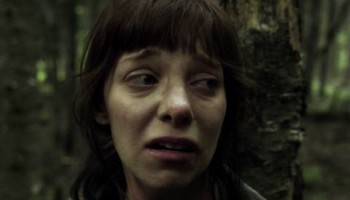 Your cast includes actors with impressive resumes, which is unusual for first-time film makers. How did you choose the people who brought your script to life?
Your cast includes actors with impressive resumes, which is unusual for first-time film makers. How did you choose the people who brought your script to life?
Our advantage was that although this is our first feature, we’ve done lots of theater and we already knew lots of great actors going into this; more than we could even use for this project. Clark and Cassidy Freeman are longtime friends and classmates from Middlebury College, as are Sam Elmore (Cy) and Tara Giordano (Jill). Alex Draper (Walter) is another Middlebury connection as he currently teaches theater there. Then there were actors we hadn’t met but who we were so lucky to get and who fit right into our little family – Anessa Ramsey from THE SIGNAL, Laura Heisler from numerous critically acclaimed performances on stage in New York City, and the great character actor Lee Wilkof, who took time off from his role as the Wizard in the national tour of Wicked to join us for a few days.
All in all, we had a group of people we knew could go to the “bad place” as professionals, without breaking down or going crazy. These actors were incredibly skilled in finding that balance and in taking care of each other – and us – every day.
YBR has been described as harkening back to horror films of the 70’s. Do you agree with this assessment and if so why or why not?
Definitely, we agree. We probably even started that talking point, because back when we were making our own websites and trailers and things, we used to take that angle. Not that we don’t love modern day horror too, but what we tried to really take from the 70s horror films we love – films like The Exorcist, Carrie, Deliverance, and 1980’s The Shining – was a sense of slow-burn storytelling that simmers before it boils, and boils before it explodes. Our movie doesn’t tell you with music cues if something is going to jump out – if you hear music, it means the characters are also hearing music, so you’re really right there in the woods with them. That’s the idea, anyway.
Nighttime in the woods seems like it would have been easy to make scary, but you managed to scare the crap out of people in the daytime. What was the logic behind filming the most horrifying scenes in broad daylight?
Well, one advantage is that it’s a lot cheaper to light the shots! Not the coolest answer, but it’s true – it’s very difficult to make an exterior night scene look good on a small budget.
Now that you definitely have our attention, what’s next for both of you?
We’re putting the finishing touches on our next script, The Forever Night. It’s our original twist on the haunted house story. But rather than a backwoods setting, this one’s set in the big city, and it plays with the audience’s experience of time in new ways. That’s all we can say for the moment, but we’re very excited to keep telling original stories.
Thanks very much for the questions, it’s been fun – and we’re definitely fans of your site!
Brilliant at scaring us silly and Black Gate fans as well? I think I need a lie down.
While I do that, you can click here to find the AMC Theater near you that’s playing YellowBrickRoad, which I’m certain will be more widely available in the very near future. Have you seen YBR or do you know of an indy horror film that deserves a wider audience? Post a comment or drop a note to sue@blackgate.com.